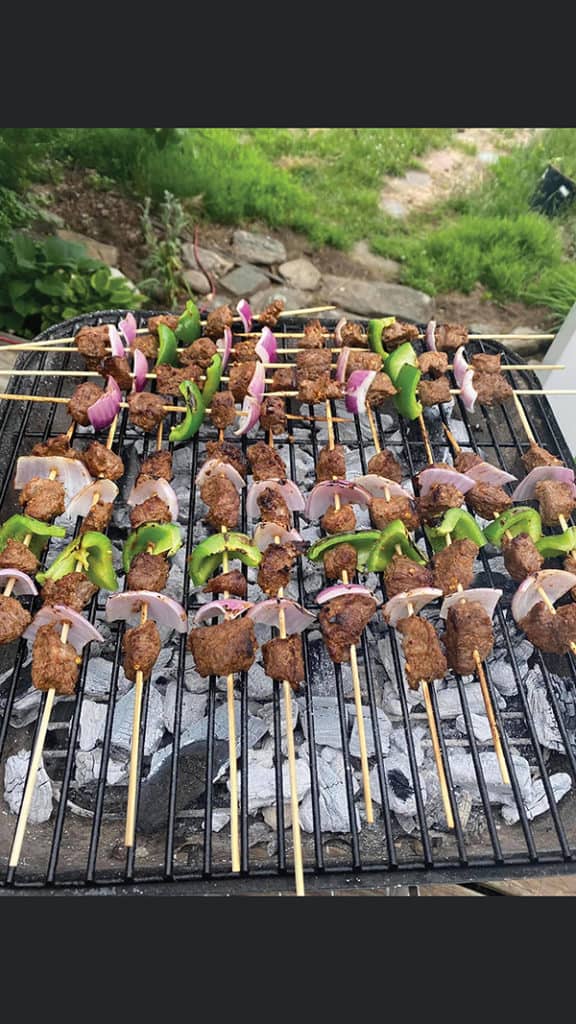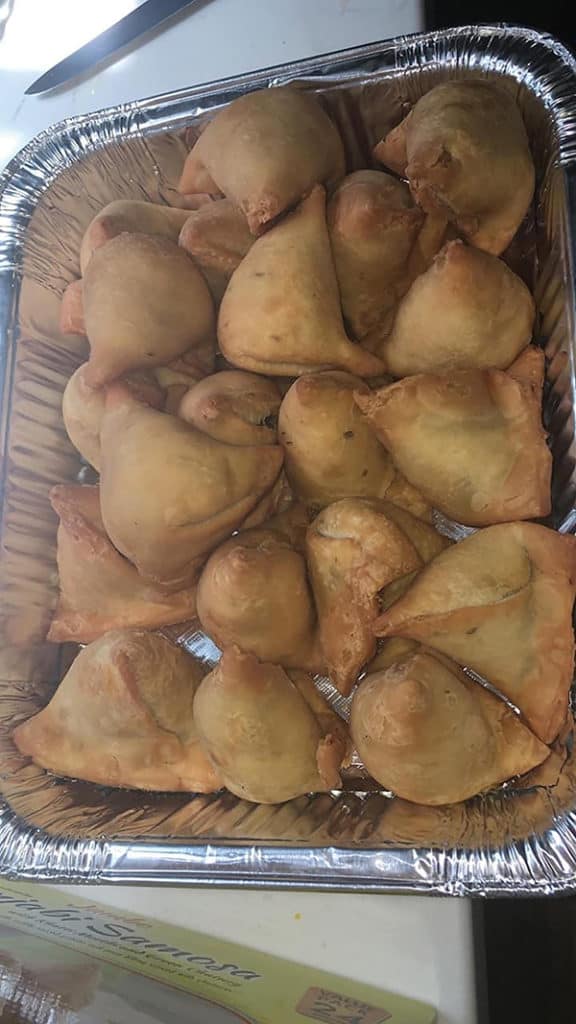By Curt Peterson
The Butt family opened their dream Middle Eastern style restaurant, Apana Grille, in Florida in late 2019, but it did not survive the Covid-19 pandemic. Yet their dream has risen from the ashes, like a phoenix, here in Hartland and Woodstock.

Beef kabobs grilled on a charcoal barbecue.
In May, 2020, Kristina Mowry, vacationing in Florida, met Omar Butt, who had come to the U.S. from Pakistan nine years earlier. They hit it off and got married. The couple recently moved to Hartland to live with Kristina’s grandmother, Carol Mowry, and Omar brought his dream of a Middle Eastern restaurant with him.
“We heard the farmers’ market was opening for in-person vending on May 28, so we decided to test the market and get our name and our food out there,” Kristina Butt said. “Kabob House,” the name of the enterprise, is a misnomer, really, as the establishment is actually a 10-foot by 10-foot tent from which they serve food at the Hartland farmers’ market on Friday afternoons from 4 p.m. to 7 p.m., and on The Green in Woodstock from 11 a.m. until the food runs out on Sundays and Mondays.
“When we decided to try the farmers’ market,” Kristina Butt told the Mountain Times, “we wanted to do everything like the other vendors do. So we bought a tent just like the ones they use. We borrowed serving tables from my grandmother.”
Because the Kabob House opened late in the pandemic, the Butts didn’t qualify for or need grants or loans from the state or federal government. Other eateries were only able to survive Covid closures and restrictions because of government support.
She heard there was a market for ready-to-eat food in Woodstock, so two-day stints on The Green sounded like an opportunity. This past Monday they sold out before 3 p.m. — they had planned to stay until seven.
Omar Butt, a trained chef, cooks the food at home so it’s ready about an hour before they open for business. Chicken and beef kabobs — both $7 — are lovingly assembled and cooked over lump charcoal, and the biryani, a rice dish with either chicken or a vegetable medley of peas, carrots, potatoes, beans and corn, is prepared in the kitchen and sold for $8. Delicious samosas, a potato pastry filled with peas and veggies, are fried in oil.

Samosas, a potato pastry filled with peas and veggies, just
pulled out of the fryer.
“We use no butter,” Kristina advised. “Early on vegetarians came to the tent and asked if we had anything they can eat.”
For drinks, Kristina recommends their mango lassi, a smoothie made from mango, milk and yoghurt, or their made-from-scratch lemonade.
Omar’s mother, who lives in New York, comes to help with the cooking. “She is a big help with the recipes,” Kristina said. “She knows the right way to cook the food.”
How’s it going?
“Really well,” Kristina said. “We have regular customers now who come every Friday for our food, we sell out before closing time on a regular basis, and we have gotten inquiries about catering private dinners.”
Omar currently makes 60 to 80 kabobs for each location each day, and the Butts think their Woodstock experiment will grow quickly.
“It’s fun, and it’s part of our marketing strategy,” Kristina said of the pop-up experiment. “Omar is a chef, and it’s his passion. We want to have a real restaurant eventually.”
Having sampled the chicken kabobs and samosas from the Hartland farmers’ market, this reporter can attest to Omar’s talents with a spoon and a grill.




